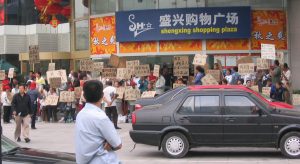Memo #246
By Carl Minzner – cminzner [at] law.fordham.edu
 Over the past decade, central Chinese leaders have changed course with regard to legal reforms they had pursued in the late twentieth century. This has eroded earlier state progress towards improving citizens’ access to justice, a reality that is fanning the flames of social unrest.
Over the past decade, central Chinese leaders have changed course with regard to legal reforms they had pursued in the late twentieth century. This has eroded earlier state progress towards improving citizens’ access to justice, a reality that is fanning the flames of social unrest.
Over the previous three decades, political and legal reforms in China dramatically improved channels for redress of citizen grievances. Starting in the late 1970s, Chinese leaders began to retreat from the Maoist economic, political, and ideological controls they had used to govern the People’s Republic of China from its establishment. In the following two decades, they attempted to build new institutions—centred on law, litigation, and the courts—to resolve both civil disputes between citizens and administrative grievances against the state. Citizen use of these new legal channels boomed. The numbers of lawsuits surged. Rural residents appropriated new central slogans regarding the rule of law in their efforts to defend their interests. And a cadre of public interest lawyers emerged, adept at fusing legal challenges with savvy use of the media to challenge the abuses of local governments.
But in the early 2000s, Chinese authorities grew increasingly uncomfortable with these developments, faulting them for contributing to a rising wave of citizen protests and undermining one-Party control. As a result, they began to turn against their earlier efforts to steer disputes into formal court channels. They launched new political campaigns within the Chinese judiciary reasserting Party controls, and they tightened repression of public interest legal activists.
This shift has weakened protections for citizen rights that state authorities had themselves attempted to build. They have led judges to abandon procedural and substantive legal norms in an effort to prevent disputes from rising to higher authorities. And they are increasingly driving Chinese citizens to conclude that the best chance for resolving their grievances lies not within the state legal institutions that have been gradually undermined, but in direct street action.
About the Author:
Carl Minzner is an Associate Professor of Law at the School of Law of Fordham University. He is an expert in Chinese law and governance, topics on which he has published extensively in both academic journals and the popular press.

In Beijing in 2008, Chinese publicly protest the lack of disability support (photo by Felix Andrews).
Links:
- Carl Minzner, “China’s Turn Against Law,” Human Rights Watch, October 2013
- Carl Minzner, “China at the Tipping Point? The Turn Against Legal Reform,” Social Science Research Network, January 2013
- Carl Minzner, “Xinfang: An Alternative to Formal Chinese Legal Institutions,” Social Science Research Network, February 2010
Related Memos:
- See our other memos on China
Comments are closed, but trackbacks and pingbacks are open.